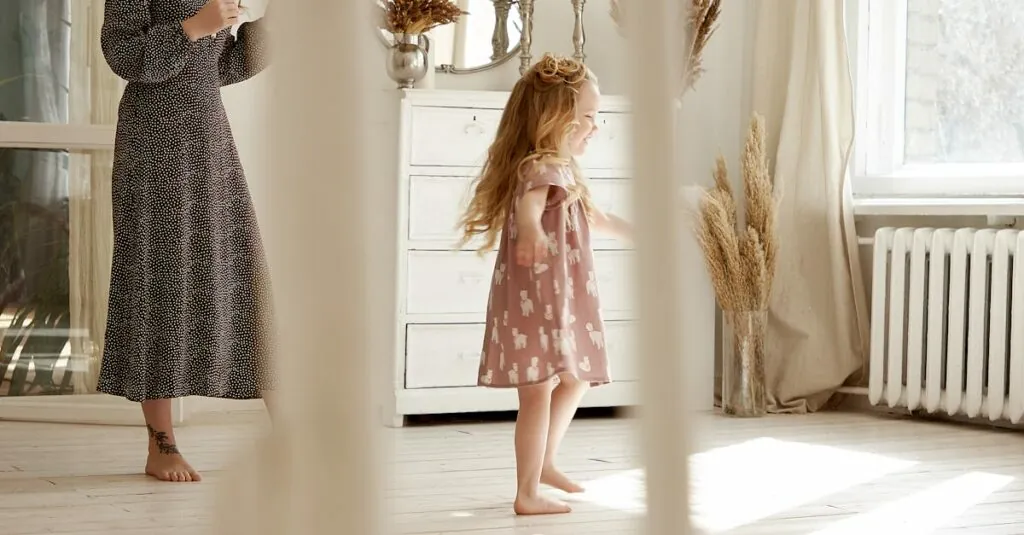Table of Contents
ToggleNavigating the wild world of parenting can feel like trying to assemble IKEA furniture without the instructions. With so many approaches out there, how does one choose the right style? From the authoritative to the permissive, each parenting style comes with its own set of pros, cons, and occasional eye rolls.
Overview of Parenting Styles
Parenting styles encompass distinct approaches that influence a child’s development. Research identifies four primary styles: authoritative, authoritarian, permissive, and neglectful. Each style varies in aspects such as responsiveness and demandingness.
Authoritative parenting combines structure with support. Parents actively engage with their children, fostering open communication while setting clear expectations. Studies indicate that children raised in authoritative households often exhibit higher self-esteem and better social skills.
Authoritarian parenting emphasizes obedience and discipline. Parents enforce strict rules with little room for negotiation. Children in these environments may develop strong respect for authority, but may struggle with self-esteem or decision-making skills.
Permissive parenting grants children significant freedom. Parents adopt a lenient approach, often acting more like friends than authority figures. Research shows that while these children may be more creative, they may also face challenges with self-discipline and responsibility.
Neglectful parenting lacks both responsiveness and demandingness. Parents provide minimal supervision or emotional support, which can negatively impact a child’s social and emotional development. Evidence suggests that children from neglectful backgrounds often face issues in forming healthy relationships.
Understanding these parenting styles aids individuals in assessing their approach. Each style’s effects can vary greatly depending on the child’s personality and environment. By recognizing the traits of each category, caregivers can refine their methods to promote positive outcomes.
Authoritative Parenting
Authoritative parenting strikes a balance between structure and support. This style fosters clear communication and establishes expectations, allowing children to thrive emotionally and socially.
Characteristics
Authoritative parents demonstrate high responsiveness and high demandingness. They set clear rules while remaining flexible and open to discussion. Consistency in discipline reinforces boundaries, yet they encourage independence and self-expression. Active listening plays a significant role, helping children feel heard and valued. Empathy is prevalent, enabling parents to connect with their children’s emotions.
Effects on Children
Children raised in authoritative households exhibit higher self-esteem and greater social competence. They often perform better academically, showing improved motivation and engagement in school. Emotional regulation develops effectively, leading to strong problem-solving skills and healthy relationships. Independence fosters, allowing them to become responsible decision-makers. Overall, authoritative parenting correlates with positive behavior and better adjustment across various life domains.
Authoritarian Parenting
Authoritarian parenting focuses on strict rules and high expectations, often emphasizing obedience and discipline. This style prioritizes control over children’s behavior, leaving little room for flexibility.
Characteristics
Authoritarian parents enforce rules without much input from their children. They value discipline, demanding compliance with limited explanation. Communication often lacks warmth, making it less emotionally supportive. Control defines this style, as parents expect children to adhere strictly to established rules. Emotional nurturing typically receives lower priority, fostering an environment where children may fear making mistakes.
Effects on Children
Children raised in authoritarian homes may develop respect for authority figures. They often show strong compliance but might struggle with self-esteem and independence. Many display difficulties in decision-making due to a lack of practice in evaluating choices. Some children exhibit higher levels of anxiety, linked to the pressure of meeting strict expectations. Socially, these children might find interactions challenging, fearing judgment or disapproval from others.
Permissive Parenting
Permissive parenting emphasizes freedom and child-led decision-making. Parents in this style prioritize nurturing and supportive relationships, often acting more like friends than authority figures.
Characteristics
Parents display high warmth and low demands within permissive parenting. They’re typically lenient, allowing children to regulate their own activities. Flexibility defines their approach to rules, with minimal enforcement of boundaries. Many permissive parents encourage self-expression, trusting their children to make choices. This style fosters open communication, where children feel comfortable expressing their feelings and opinions. As a result, the focus often remains on maintaining a positive relationship rather than imposing strict discipline.
Effects on Children
Children raised with permissive parenting often display creativity and self-confidence. They excel in environments where self-exploration is encouraged. However, a lack of boundaries may lead to difficulties in self-discipline. Emotional regulation can be challenging for these children, as expectations remain unclear. Furthermore, they may struggle with responsibility due to insufficient guidance. This parenting style may result in children who are unprepared for challenges, lacking the skills necessary for navigating obstacles effectively.
Uninvolved Parenting
Uninvolved parenting, also known as neglectful parenting, severely lacks engagement and support. Parents typically remain distant, offering minimal guidance or attention to their children’s needs.
Characteristics
Neglectful parents exhibit low responsiveness and low demands. They often provide basic necessities like food, shelter, and clothing but neglect emotional needs. These parents typically disengage from their children’s lives, showing little interest in their activities or well-being. Lack of structure and rules is common, leading to an absence of supervision. Many uninvolved parents may prioritize their own interests, leaving children to navigate life independently. Due to this detachment, children often lack a sense of belonging and security, affecting their overall development.
Effects on Children
Children raised under uninvolved parenting often struggle with various emotional and social challenges. They may develop issues related to self-esteem and emotional regulation due to inadequate support and guidance. Difficulty forming healthy relationships frequently arises, as these children often lack essential social skills. Academic performance can suffer due to minimal parental involvement in schooling and homework. Additionally, these children may face increased risks of behavioral problems and mental health issues. They often feel neglected, leading to feelings of worthlessness and isolation.
Parenting Styles Comparison
Parenting styles significantly affect children’s development and behavior. Each style carries unique traits that shape a child’s experience.
Similarities and Differences
Similarities exist among the four primary parenting styles, yet differences are prominent. Authoritative and permissive styles share an emphasis on warmth, but only authoritative parenting maintains structure. Authoritarian and neglectful approaches exhibit low warmth, leading to emotional challenges in children. Authoritative and authoritarian styles focus on control and expectations, although the former allows open communication, while the latter lacks responsiveness. Ultimately, these comparisons highlight the varying dynamics between support and discipline in different parenting methods, influencing children’s upbringing in distinct ways.
Impact on Child Development
Child development varies significantly across parenting styles. Authoritative parenting promotes high self-esteem, social competence, and emotional regulation, equipping children for success in various life aspects. Conversely, authoritarian parenting cultivates a fear of mistakes, hampering self-esteem and independence. Permissive parenting encourages creativity but can lead to difficulties with self-discipline and responsibility. Neglectful parenting, lacking engagement, fosters feelings of worthlessness and isolation. Understanding these impacts aids parents in choosing approaches that support healthier development in their children.
Conclusion
Navigating the world of parenting styles is a complex journey filled with choices that shape children’s futures. Each style brings its own set of benefits and challenges that can influence a child’s emotional and social development.
While authoritative parenting stands out for fostering self-esteem and healthy relationships, other styles like authoritarian, permissive, and neglectful can lead to various emotional hurdles. Recognizing the nuances of these approaches empowers parents to make informed decisions that align with their values and their children’s needs.
Ultimately, understanding these dynamics can guide parents toward nurturing environments that promote resilience and well-rounded development in their children.







